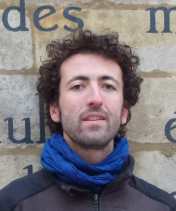The MEDECOS XIV International Conference and XIII AEET meeting was held last week (January 31st – February 4th) in Seville (Spain). If you could not make it, you can hear all about it in the new blog post below from our Associate Editor, Ignasi Bartomeus. Ignasi has kindly agreed to share his thoughts with you on the best moments of the meeting.

Ignasi Bartomeus Associate Editor
This year I helped organise the Spanish Society of Terrestrial Ecology (AEET) and MEDECOS conference, which was a very fun international conference, attended by approximately 600 people. Here are a few highlights:
1) The diversity of topics: One very cool thing about assisting different EU societal conferences is that you start noticing a pattern of different topics studied in different places. Here in Spain, the kings are fire and drought, with a lot of plant evolution too. As these are not my topics, it was a great opportunity to learn more about them and experience great talks such as Susan Harrison on Californian endemics.
2) Species interactions: The conference is big and there were plenty of other important topics discussed. One omnipresent topic these days is global change impacts. My favourite topic, however, is species interactions, and we had the chance to listen to an inspiring talk by Miguel Verdú showing the insights of plant-plant facilitation and Julia Chacon-Labella explained recently published in Journal of Ecology paper (see also, Julia’s video podcast). I have also noticed there is an increasing interest in pollinator-mediated plant coexistence; Tia-Lynn Ashman, Carlos Herrera and Jose Barragán showed with very different approaches that pollinators can have stabilising mechanics.
 3) Reproducible and open science: This year we organised a symposium and two workshops on this topic and there was a blast of participation. I especially noticed that young researchers understand that for the advancement of science, we need better practices on sharing our research products and being transparent about how we generate them. Rob Salguero-Gomez‘s talk on the comadre and compadre databases was enlightening (here is a podcast interview with Rob) and Marta Rueda showed the potential of big data and clustering algorithms for revisiting Humboldt biogeography patterns.
3) Reproducible and open science: This year we organised a symposium and two workshops on this topic and there was a blast of participation. I especially noticed that young researchers understand that for the advancement of science, we need better practices on sharing our research products and being transparent about how we generate them. Rob Salguero-Gomez‘s talk on the comadre and compadre databases was enlightening (here is a podcast interview with Rob) and Marta Rueda showed the potential of big data and clustering algorithms for revisiting Humboldt biogeography patterns.
4) Spanish science abroad: On a bittersweet note, I felt very proud of the high level of Spanish researchers. We have great senior researchers (great talks by Pedro Jordano and Fernando Maestre, for example!) but I also chatted with a lot of talented researchers without contracts or with very precarious contracts in Spain, and with even more researchers working elsewhere due to the low investment in science in its own country. Working abroad is great for many reasons, but it can be very hard for maintaining a decent work-life balance. Spain is doing an odd job forming great researchers to export the best brains elsewhere at zero cost. If this trend continues we will lose a full generation of talent.
Ignasi Bartomeus
Associate Editor, Journal of Ecology


Pingback: #AEETMED | Bartomeus lab
Pingback: Congresos científicos y Twitter (I): un análisis de #AEETMED – Forestalia
Pingback: Special Feature: Biotic controls of plant coexistence | Journal of Ecology Blog
Pingback: Special Feature: Biotic controls of plant coexistence - ecosuck